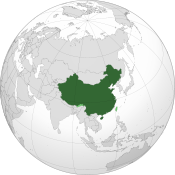China warns US to avoid trade confrontation
Tuesday, May 22, 2007

Speaking in Washington Tuesday at the conclusion of the China-U.S. trade summit, Chinese Vice Premier Wu Yi warned the U.S. not to pursue a 'blame game' in continued trade negotiations. "We should not easily blame the other side for our own domestic problems," Wu said, speaking through an interpreter. "Confrontation does no good at all to problem-solving."
The valuation of the Chinese Yuan has been closely tied to the U.S. Dollar for years. Critics charge that this resulted in a relatively low value, making Chinese goods cheaper in the U.S., contributing to the current trade imbalance that favours China.
Although the Chinese government expanded the band in which the Yuan can float (relative to the U.S. Dollar) from 0.3 percent to 0.5 percent last Friday, critics say the measure doesn't go far enough to address the U.S. trade deficit. Members of the U.S. Congress have blamed China's policy of currency manipulation for the rising trade imbalance and a 16 percent drop in manufacturing jobs since 2000. In 2006, U.S. imports from China exceeded exports by US$232.5 billion, almost one third of the total trade deficit of US$765.3 billion.
In April, the U.S. Department of Commerce filed a WTO piracy complaint against China. Subsequently, China has agreed to talks and has issued some internal guidelines to address the issue. Wu said that both sides should "firmly oppose trade protectionism." She said that any effort to "politicize" the economic relationship between the two nations would be "absolutely unacceptable."
"The Chinese government will agree to U.S. demands" on piracy, predicted Albert Louie, in April, about the upcoming talks. Louie is the managing partner of A. Louie Associates, an anti-piracy company in based in China. "There is no question the government wants to crack down on counterfeiters. What remains in question is the consistency of enforcement," he added.
The U.S. delegation also highlighted food safety as a concern with imports from China. The example of melamine-tainted pet food ingredients imported from China recently was used as an example of weak health and environmental controls in China. U.S. trade delegate Susan Schwab said the issue of food safety was raised by Agriculture Secretary Mike Johanns and Health and Human Services Secretary Michael Leavitt. "This is not necessarily reflective of more protectionism or anti-Chinese sentiment, but rather that there are concerns there and we need to be responsive," said Schwab.
It is hoped that breakthroughs will be reached on issues such as U.S. complaints of high Chinese import duties on U.S. energy technology products and the restriction on U.S. airline flights to China.
In the US Congress, a number of potential bills that would impose trade restrictions on China, are being pursued. Recently, a trade panel voted to impose a 44.3 percent tariff on polyester imports. Meanwhile, the Bush administration increased duties on certain types of glossy paper from China. A bill imposing 27 percent tariff on all Chinese goods has been proposed in Congress but hasn't yet passed.
"The frustration that I and many of my colleagues in the Senate feel is that China is not satisfying its obligations as a member of the WTO and as a major beneficiary of open trade," wrote Charles Grassley, chairman of the Senate Finance Committee, in a letter sent to Wu in advance of the summit.
Related news
- "Wikinews Shorts: May 22, 2007" — Wikinews, May 22, 2007
Sources
- Martin Crutsinger. "US Hears Blunt Trade Warning From China" — Forbes Online, May 22, 2007
- Rowan Callick. "US looks set for trade war with Chinese" — The Australian, May 22, 2007
- "China, US to discuss IPR protection" — China Daily Online, May 16, 2007
- Press Release: "China-US trade relations hailed, beef ban lifted" — The Asia Times Online, April 13, 2006
- Mark Drajem. "China May Pledge Piracy Crackdown at U.S. Summit" — Bloomberg Online, April 11, 2007



